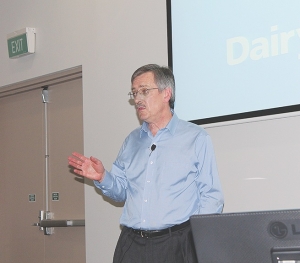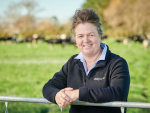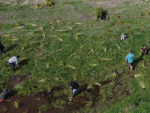That question was put to business journalist and commentator Rod Oram at the Fonterra Shareholders’ Council ‘Grow Your Minds’ seminar in Hamiton. He was asked if the 10,500 shareholder dairy farmers who own Fonterra need to change their mindset about being 100% owned and controlled by those farmers.
Oram said he found the whole discussion over the last 3-4 years about the structure of Fonterra “extremely encouraging and interesting, even if it got pretty rocky there at some points”.
“But I think it got to a very sensible place. There is huge value in Fonterra remaining a co-op and 100% farmer owned.
“I know with trading among farmers (TAF) and the Fonterra units bringing in some capital you are trying to do a difficult thing. This is to balance out and meet the expectations of growth from farmers who want a very good return on their milk and those outside investors whom you could say – and this was the argument against this – just want the lowest possible prices for the milk payment system so they could take a bigger share of the profits.
“These are all very big issues to deal with but I believe with TAF and the Fonterra units you got a system which will improve, develop and help with some of those capital needs.
“There will be outside sources as well. An interesting test is to be able to, say, see whether Synlait can get its second attempt at a share market float going this time. I think it sounds very chancy.”
Oram said by retaining 100% farmer ownership they could keep good control of their destiny but good investment could come in elsewhere across the primary sector.
“The very biggest benefit to the industry would be to achieve higher profitability so you could meet more of the capital needs internally.”
Oram said shareholders should be ositive about the Fonterra strategy refresh which came out last year as it was “the right way forward”.
But in years ahead “we have a difficult choice to make about the extent to which we become more intensive dairy farmers. I am all for that as long we can do it in a way which is true to the economics and ethos of pastoral dairy farming.
“How do we manage to have a higher stocking rate and manage those environmental impacts? Can that help us farm more profitably and in an environmentally more sustainable way. But crucially, how will the markets respond?”
A key example was the response to the dicyandiamide (DCD) issue. We did not as a country explain it well to the markets and we did not grasp that “it was an amazing challenge to those Chinese consumers. They were thinking in their minds ‘pure New Zealand dairy product’ without realising there is already quite a level of industrial process in that.”
The industry needs to consider how to bring in more useful tools and “how do we achieve greater intensity that delivers on that economic and environmental commitment but still sits well with consumers”.
















